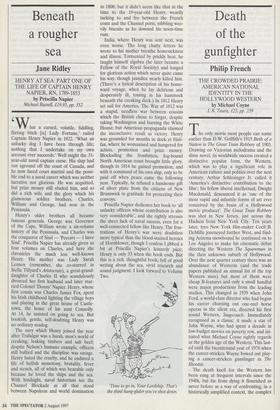Beneath a rougher sea
Jane Ridley
HENRY AT SEA: PART ONE OF THE LIFE OF CAPTAIN HENRY NAPIER, RN, 1789-1853 by Priscilla Napier Michael Russell, £19.95, pp. 352 What a cursed, volatile, fiddling, flirting bitch [is] Lady Fortune,' railed Captain Henry Napier in 1822. 'What an unlucky dog I have been through life; nothing that I undertake on my own account ever succeeds.' Well might the 31- year-old naval captain curse. His ship had run aground off the coast of Canada, and he now faced court martial and the possi- ble end to a naval career which was neither lucrative nor glorious. He was acquitted, but prize money still eluded him, and so did a rich wife and the glory which his glamorous soldier brothers, Charles, William and George, had won in the Peninsula.
Henry's older brothers all became famous generals. George was Governor of the Cape, William wrote a six-volume history of the Peninsula, and Charles was the conqueror of Sind — Peccavi — I have Sind'. Priscilla Napier has already given us four volumes on Charles, and here she chronicles the much less well-known Henry. His mother was Lady Sarah Lennox (remember, she co-starred in Stella Tillyard's Aristocrats), a great-grand- daughter of Charles II who scandalously divorced her first husband and later mar- ried Colonel 'Donny' Napier. Henry, whose first cousin was Charles James Fox, spent his Irish childhood fighting the village boys and playing in the great house of Castle- town, the home of his aunt Connolly. At 14, he insisted on going to sea. But bookish, gentle, self-doubting Henry was no ordinary seadog.
The navy which Henry joined the year after Trafalgar was a harsh, man's world of creaking, leaking timbers and salt beef; despite Nelson's humane example, officers still bullied and the discipline was savage. Henry hated the cruelty, and he endured a life of hellish monotony, brutality, fever and stench, all of which was bearable only because he loved the ships and the sea. With hindsight, naval historians see the Channel Blockade as all that stood between Napoleon and world domination in 1808; but it didn't seem like that at the time to the 19-year-old Henry, wearily tacking to and fro between the French coast and the Channel ports, nibbling wee- vily biscuits as he downed his noon-time rum.
India, where Henry was sent next, was even worse. The long chatty letters he wrote to his mother breathe homesickness and illness. Tormented by prickly heat, he taught himself algebra (he later became a Fellow of the Royal Society) and longed for glorious action which never quite came his way, though jaundice nearly killed him. (There's a lyrical description of his home- ward voyage, when he lay delirious and desperately ill, tossing in his hammock beneath the creaking deck.) In 1812 Henry set sail for America. The War of 1812 was a stupid, needless war between cousins which the British chose to forget, despite taking Washington and burning the White House; but American propaganda claimed the inconclusive result as victory. Henry was grounded for months in dock at Hali- fax, where he womanised and hungered for action, promotion and prize money. Blockading the frostbitten, fog-bound North American coast brought little glory, though in 1814 he gained promotion, and with it command of his own ship, only to be paid off when peace came the following year. Typically, he refused a handsome gift of silver plate from the citizens of New Brunswick in gratitude for protecting their convoys.
Priscilla Napier dedicates her book to 'all unlucky officers whose contribution is also very considerable', and she rightly stresses the sheer luck of naval success, even for a well-connected fellow like Henry. The frus- trations of Henry's war were doubtless more typical than the blood-stained heroics of Homblower, though I confess I jibbed a bit at Priscilla Napier's leisurely pace; Henry is only 33 when the book ends. But this is a rich, thoughtful book, full of good writing about the sea, vivid research and sound judgment. I look forward to Volume Two.
`Time to go in, Your Lordship. That's the third hang-glider you've shot down.'


























































 Previous page
Previous page